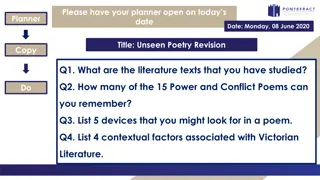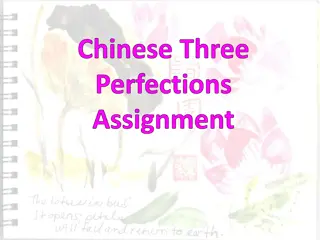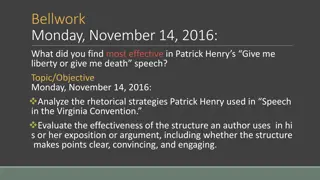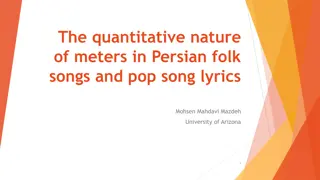Analyzing Rhetorical Strategies in Poetry
Explore how authors use rhetorical strategies to appeal to primary and secondary audiences in a series of poetic texts by Robert Graves and N. Scott Momaday. The poems offer insights into themes of nature, war, remembrance, and cultural traditions, showcasing the power of language to connect with readers on emotional and intellectual levels.
Download Presentation

Please find below an Image/Link to download the presentation.
The content on the website is provided AS IS for your information and personal use only. It may not be sold, licensed, or shared on other websites without obtaining consent from the author.If you encounter any issues during the download, it is possible that the publisher has removed the file from their server.
You are allowed to download the files provided on this website for personal or commercial use, subject to the condition that they are used lawfully. All files are the property of their respective owners.
The content on the website is provided AS IS for your information and personal use only. It may not be sold, licensed, or shared on other websites without obtaining consent from the author.
E N D
Presentation Transcript
ii. Identifying the primary and secondary audience of a text
1. You will see a series of texts. Some texts will have additional context. 2. For each text, work individually or with a partner to try to determine how the authors use particular rhetorical strategies to appeal to their primary and secondary audiences. 3. If you have difficulty determining rhetorical strategoes, work with your partner(s) to help you understand the texts
1915 By Robert Graves I ve watched the Seasons passing slow, so slow, In the fields between La Bass eand Bethune; Primroses and the first warm day of Spring, Red poppy floods of June, August, and yellowing Autumn, so To Winter nights knee-deep in mud or snow, And you ve been everything. Dear, you ve been everything that I most lack In these soul-deadening trenches pictures, books, Music, the quiet of an English wood, Beautiful comrade-looks, The narrow, bouldered mountain-track, The broad, full-bosomed ocean, green and black, And Peace, and all that s good.
December 29, 1890* by N. Scott Momaday In the shine of photographs are the slain, frozen and black on a simple field of snow. They image ceremony. Women and children dancing, old men prancing, making fun. In Autumn there were songs, long since muted in the blizzard. In summer, the wild buckwheat shone like foxfur and quillwork. And dust guttered on the creek. Now in serene attitudes of dance, the dead in glossy death are drawn in ancient light.























